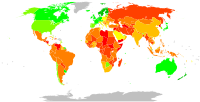
Photo from wikipedia
ABSTRACT Corruption schemes and operations have increasingly taken on networked features. Building on insights from Social Exchange Theory and Relational Sociology, this article seeks to construct a network-exchange approach to… Click to show full abstract
ABSTRACT Corruption schemes and operations have increasingly taken on networked features. Building on insights from Social Exchange Theory and Relational Sociology, this article seeks to construct a network-exchange approach to analyze the structure and operation of corruption networks. Using a Chinese corruption network that involved 161 connected individuals as a strategic case, this article shows that corruption networks expand by spanning institutions and enlisting strategic resource holders through brokerage activities. Four types of brokerage situations are found in the context of Chinese political economy: frequently transferred officials spanning bureaucratic jurisdictions, private entrepreneurs bridging different groups of officials, relatives of officials connecting officials and private entrepreneurs, and managers of state-owned enterprise going between the public and private sector. I show that while the institutional locations of brokers and their partners affected the specific kinds of goods being exchanged, all four boundary-spanning activities relied on longstanding dyadic exchange, a heterogeneity of goods, and an informal rule of reciprocity to maintain relationships and stabilize transactions. By uncovering the network construction of incentives, power, and organizations, this article seeks to develop insights and implications for the prosecution and prevention of corruption.
Journal Title: Deviant Behavior
Year Published: 2019
Link to full text (if available)
Share on Social Media: Sign Up to like & get
recommendations!